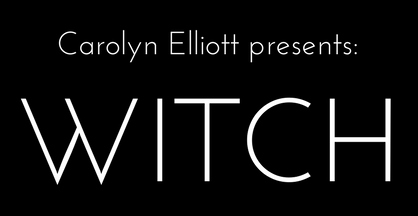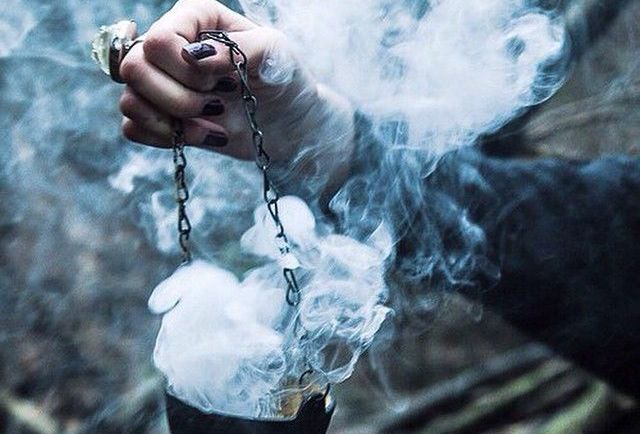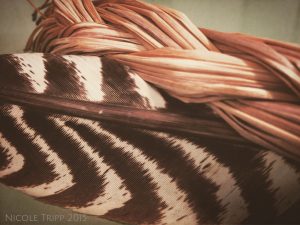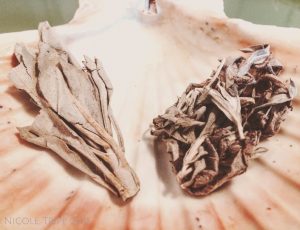by Nicole Francesca
Smudging involves the burning of certain herbs to purify negativity and bring divine goodness into its place. Four tools are typically used: sacred herbs (Earth), a feather for stoking (Air), a shell for holding the herbs (Water), and a lighter or matches (Fire).
I learned smudging from elders teaching Lakota and Chippewa ways, and it has become a daily practice for me. I’ve come to realize some things in the last ten years that, collectively, we non-natives who smudge tend to fail at (or were never taught in the first place).
Here are 5 ways we can get our shit together with smudging:
1. Express gratitude to your tools.
Everything we use for smudging sacrificed so that it could become a tool for our spiritual growth. Our herbs were once living plants with life stories, as were the bird that gave up a feather and mollusk that gave up its shell.
A plastic lighter will end up in a landfill for the rest of eternity (you’re welcome, Mother Earth), and the wood from our matches came from harvested trees. They deserve our thanks.
It not only honors your tools when you express gratitude, it honors the ancestors who provided the teachings so that you could have those tools in the first place.
You can do this through offerings of words, poetry, song, art, drumming, cornmeal, rose petals, rosewater, moon-charged water, some of your hair, or anything else that’s sacred or meaningful to you.
2. Respect your tools.
Remember that they have agreed to work with you, not do your work for you.
Respect and gratitude go hand-in-hand, but respect honors these tools as living elements to your spiritual evolution.
Keep your tools wrapped in special cloth or in a special box or a lined drawer when not in use. Definitely keep them somewhere they won’t collect dust or be handled casually by guests.
I also believe in getting to know your herbs’ names and stories (sage is not the same as sagebrush and they have different uses), understanding their environmental troubles (stop buying new abalone when you can find it in thrift stores, antique shops, and probably your great aunt’s attic), supporting ethical suppliers, or, better yet, by growing your own herbs in a special garden.
3. Listen to your tools.
We’ll receive messages from our tools if we develop and trust our intuition – they’re on our team, so they’ll talk to us.
For example, I felt uncomfortable using my personal kit to smudge a relative’s house, but I ignored that instinct. It took me a good week before I wanted to use my set again because it had her etheric slime all over it, so now I know to use a separate set for any work that isn’t mine.
They’ll tell us how they want to be cared for, but we have to get comfortable learning how to hear them – and then follow through.
4. Respect the cultures that gave us smudging.
I’m sure my great grandmother thirty times removed was burning bog peat or something to purify, but that’s not what I’m using when I smudge – I’m using the teachings of First Nations.
In the US, the First Nations (of which there are over 500) shared these practices and teachings with us. It’s an incredible honor and privilege to have these teachings, and pretty damn spectacular considering the atrocities that these tribes experienced through colonization.
They’re still here, they still have deep cultural heritages, and they still face many residual traumas from US history. Learn about these cultures, learn and speak out about the issues they face, and learn as much as you can about respecting the tools and practices they gave to us.
Yes, they gave them to us, and they didn’t have to.
5. Decolonize your practice.
This one is as much internal as it is external, but it’s a combo of all of the above. Colonization is a thing that still affects people of color and that includes our First Nations in the US.
Imagine what it must be like to have had your great-grandparents punished for practicing their traditions (maybe even slaughtered without recourse), several generations of recuperating from the decimation of your people, and then to see ten-thousand New Age white girls talking about “saging” and how Betty White is their spirit animal. (Jk, I love you, Betty White.)
Is this to say that white girls can’t smudge and have spirit animals? Of course not. It’s about recognizing the colonial and very dark history of your spiritual practices and honoring them – not with guilt and aversion, but with humility and respect. This shit isn’t casual and it’s not here to make you cool.
Digging deep into our own privilege always feels like shit, but avoiding it because it’s uncomfortable is a sure way to stay on the wrong side of history.
Here’s a quick list of things you can do to decolonize your smudging practice:
1. Get honest. Learn true integrity. Don’t be fooled into thinking that “intention” is everything. Intention is everything in your private life; it doesn’t mean shit when you’re wearing a headdress on Instagram. That’s just ignorant, no matter how much you think you’re celebrating all the warrior women that ever lived. Take that damn headdress off and do not dress up like “Pocahottie” for a costume party.
2. Get to know what the originators of a spiritual practice have to say. As a rule of privilege and colonization, the voices of First Nations mostly go unheard. Read blogs, observe discussions, and find out what the movement wants you to know. We have to put our personal feelings aside because this isn’t about you or me; it’s about moving forward as a collectively respectful and inclusive spiritual species.
3. Celebrate indigenous cultures by reading works by indigenous authors (Crazy Brave by Joy Harjo was my favorite book of the year), going to local Pow Wows, exploring indigenous art and museums, and sharing all of these things with anyone who will listen.
We do not, I repeat, do not, celebrate indigenous culture by contributing to stereotypes by dressing up like Indians, wearing clothing by brands that feature appropriated indigenous styles, or having caricatures of native people as mascots. End of discussion.
4. Be humble. I’m not here telling you that you’re a jerk for smudging; I’m telling you that we can’t take what we like because it’s pretty and fun and ignore the dark and ugly parts. That’s appropriation. That’s colonization. We weren’t given these amazing teachings to feel guilty about them, they were a gift to help us grow spiritually – and the best way to do that is to honor both sides of their historical evolution.
Becoming a socially conscious activist is not easy, and it’s even harder when your spiritual path is all wrapped up in it (trust me, I know – this article is the culmination of many years of wrestling with everything I’ve just talked about) – but we can do this.
We have to do this. And it’s going to be awesome.
IN CONCLUSION
If this essay resonates with you, please join our WITCH email list by using the forms on this website so we can stay in touch.
About the Author:
featured image – source, other images Author’s own
Merken



